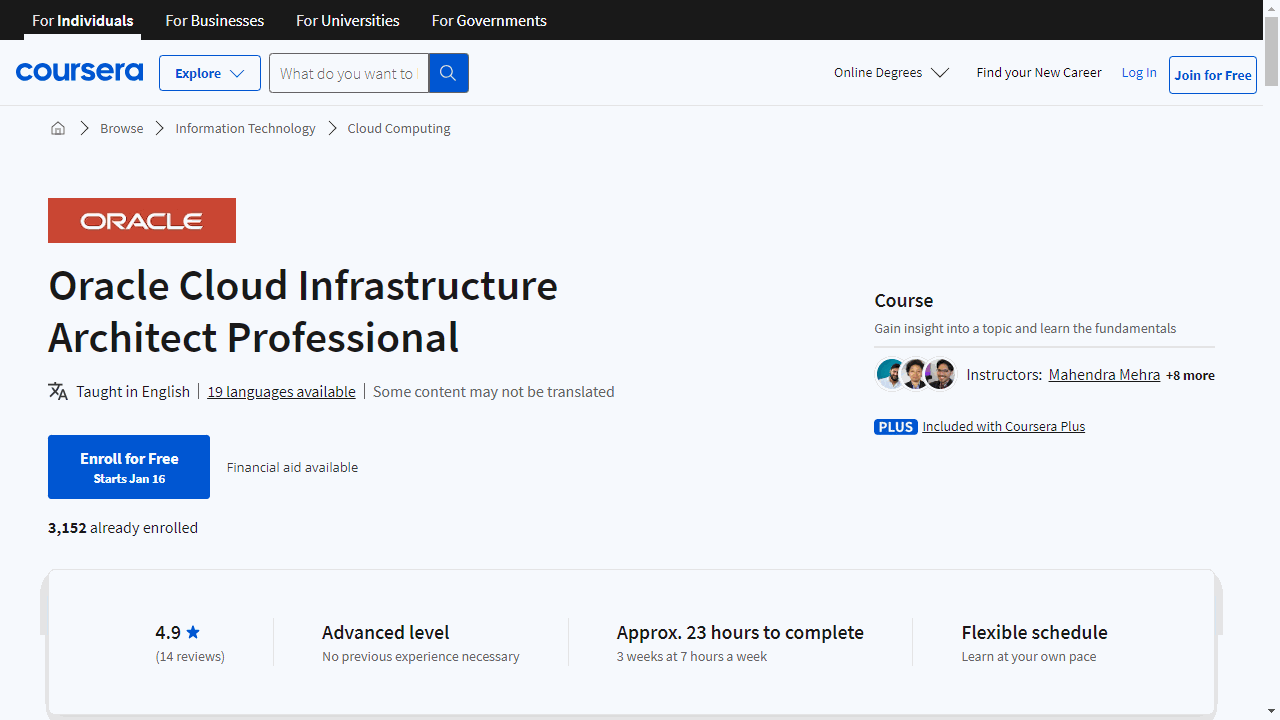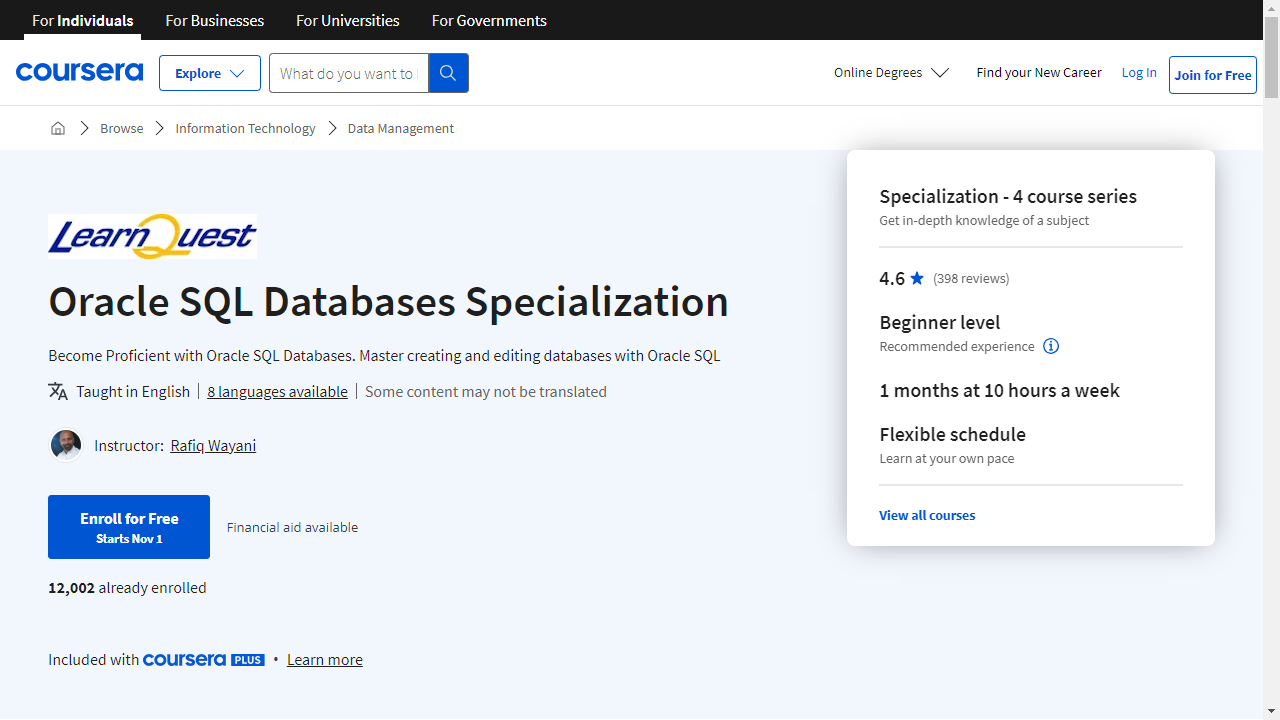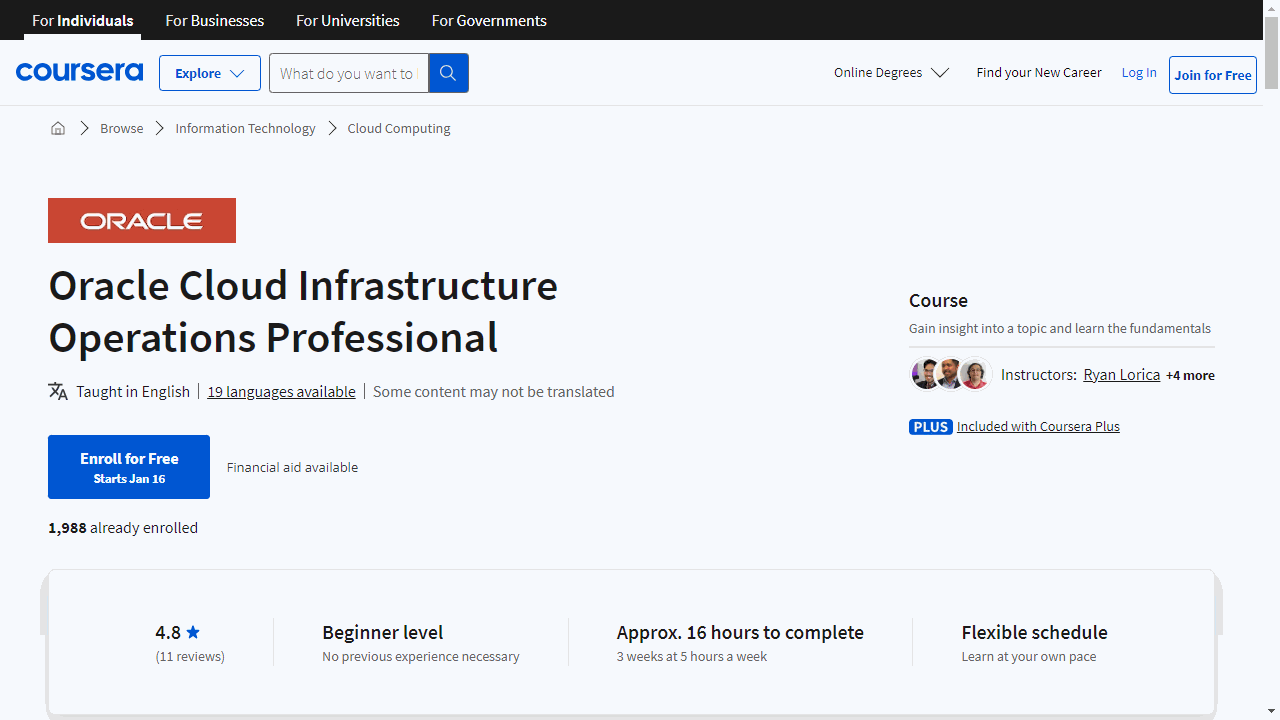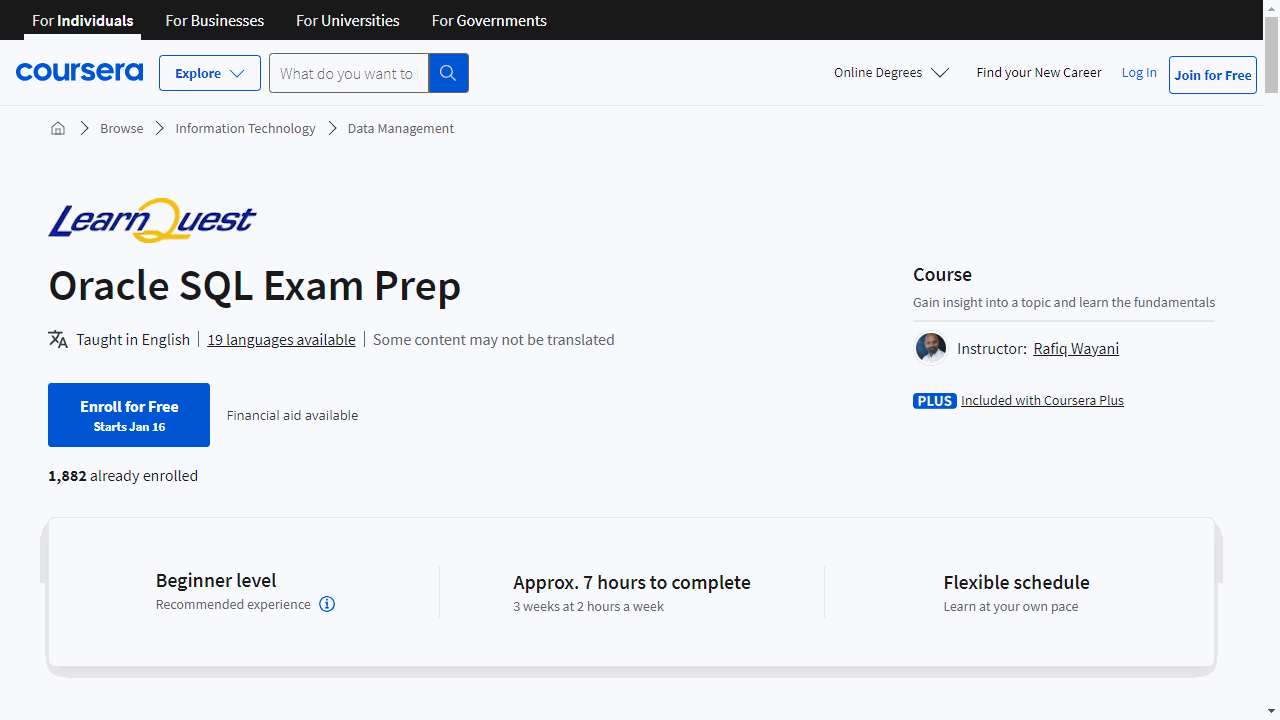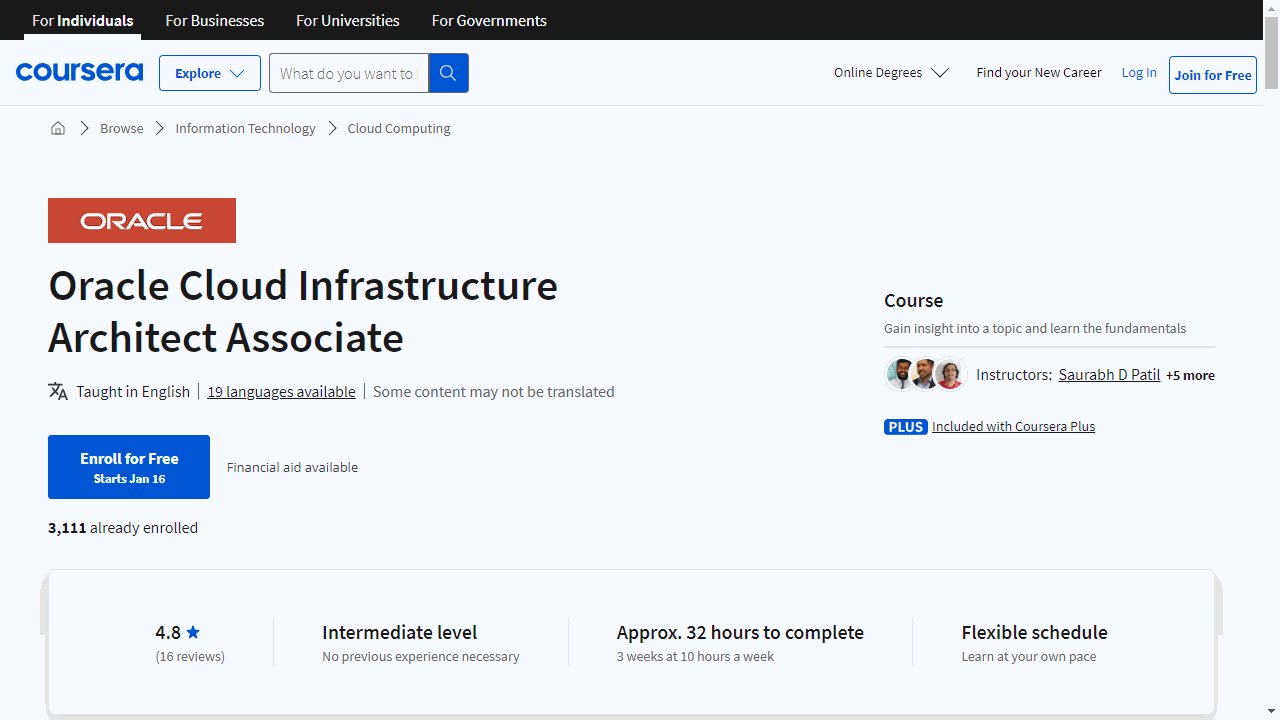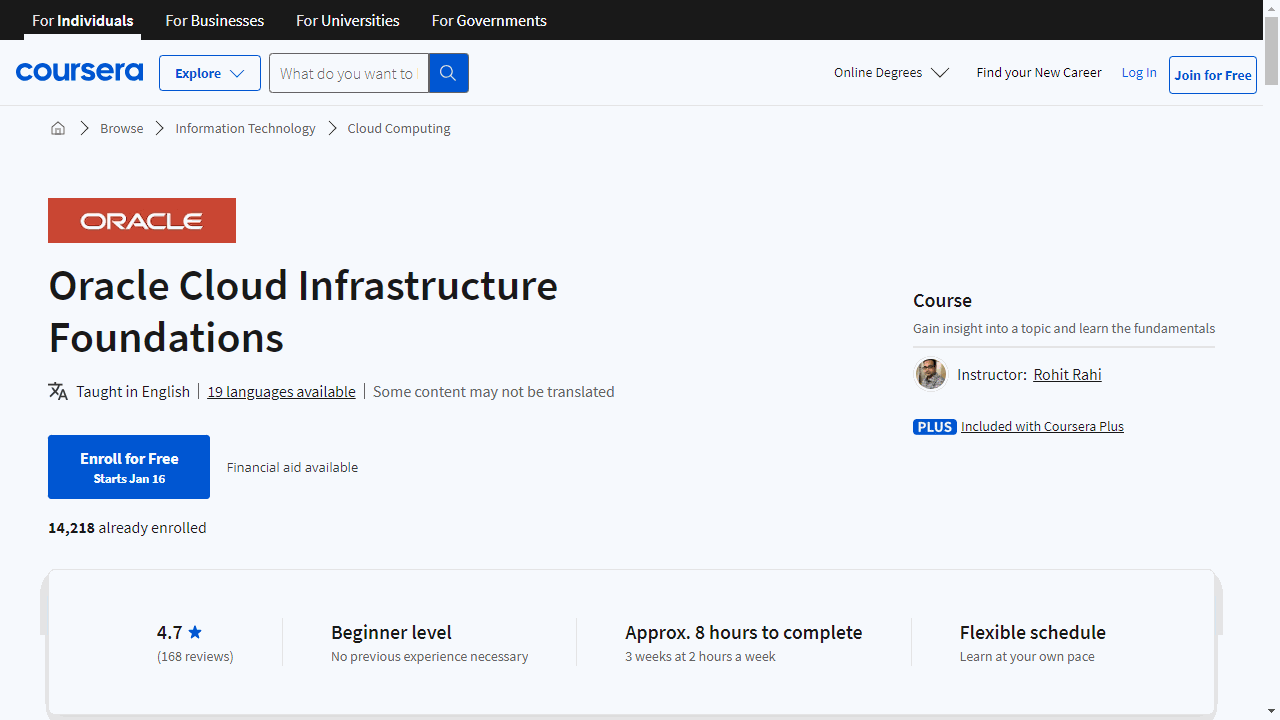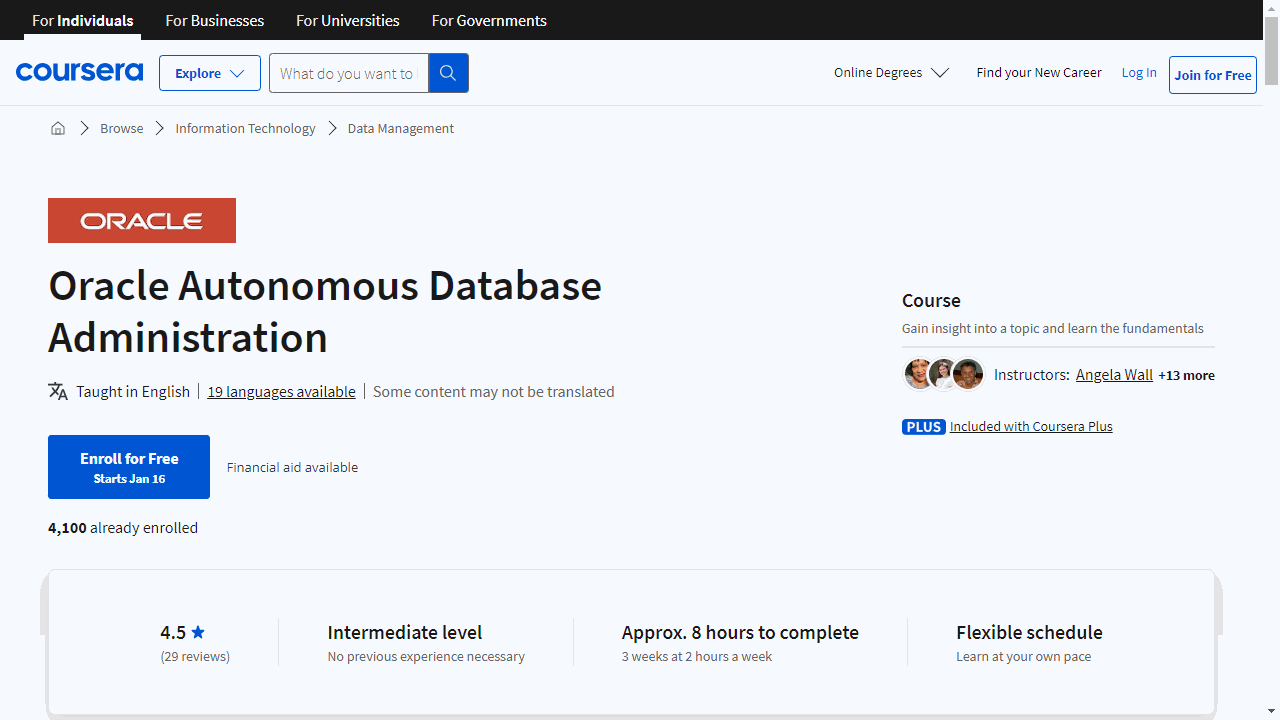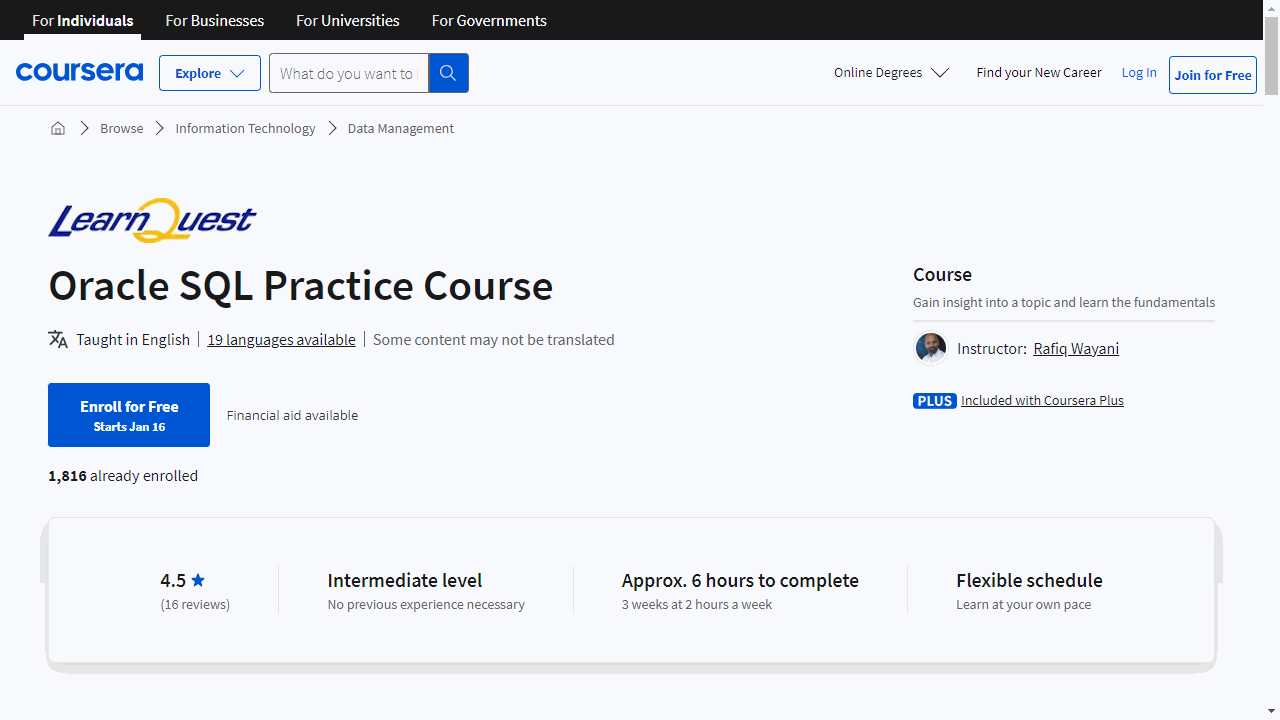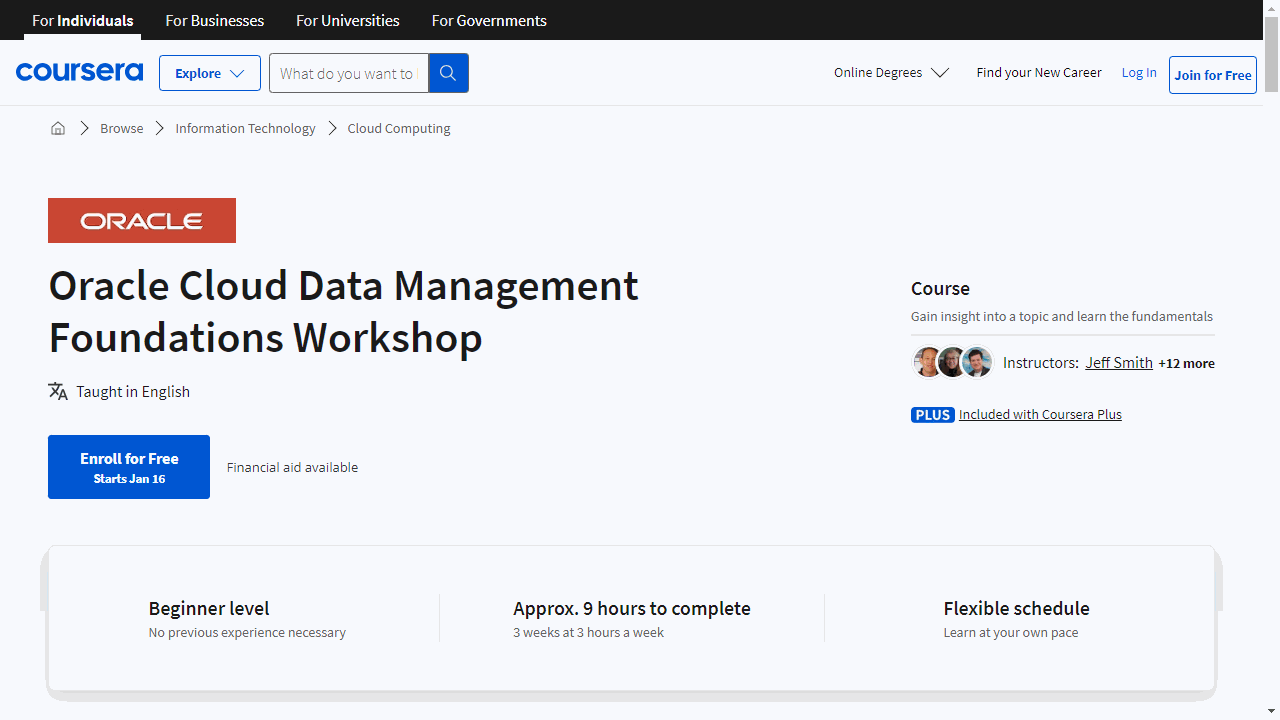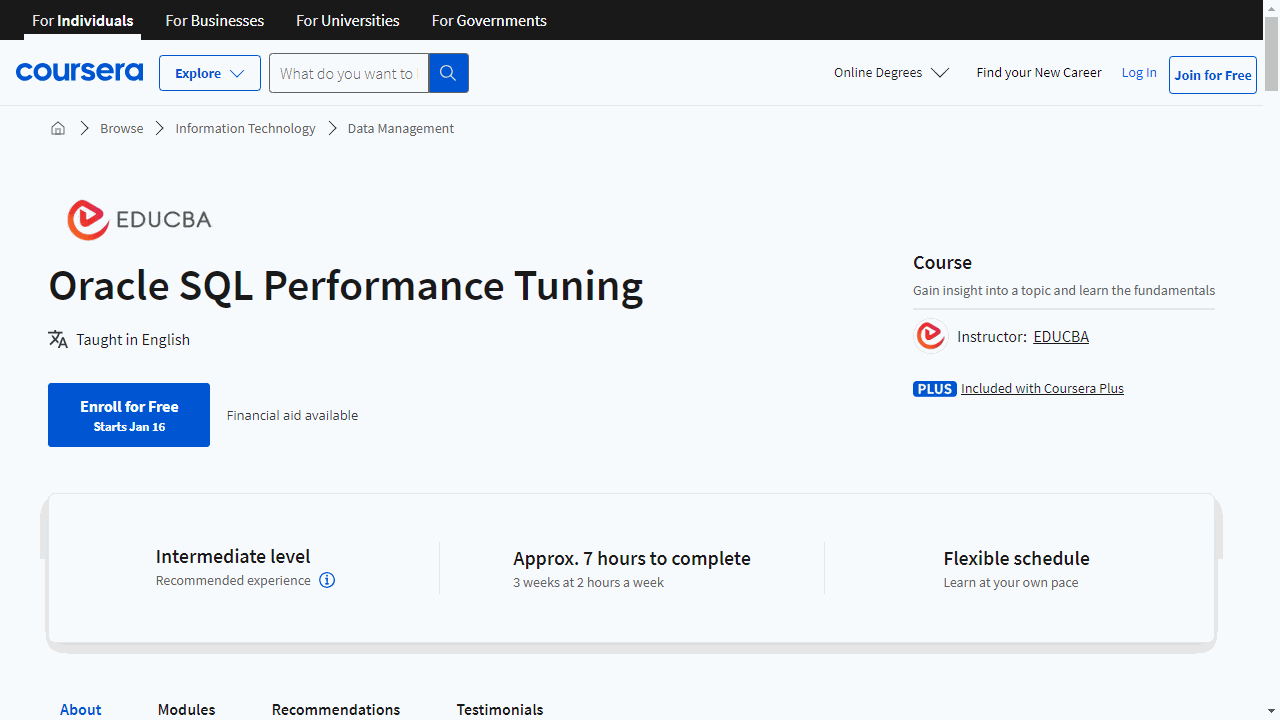Learning to work with Oracle databases can be an incredibly valuable skill, especially if you’re interested in a career in data management or software development.
But finding a good course that fits your learning style and skill level can feel overwhelming.
There are so many options out there, and it can be hard to know which ones are truly worth your time and money.
We’ve scoured Coursera for the best Oracle courses and compiled a list of our top picks.
For the best overall Oracle course, we recommend the Oracle SQL Databases Specialization.
This specialization provides a comprehensive introduction to Oracle SQL, taking you from beginner to proficient in four engaging courses.
It covers everything from the basics of database design and architecture to advanced concepts like database relationships and SQL functions.
The practical exercises and real-world case studies make this specialization an ideal choice for anyone wanting to learn the fundamentals of Oracle SQL.
But if this specialization isn’t quite right for you, don’t worry!
We’ve got plenty of other great options to choose from, including courses on Oracle Cloud Infrastructure, Oracle Autonomous Database Administration, and Oracle SQL performance tuning.
Keep reading for our curated list and find the perfect course to take your Oracle skills to the next level.
Oracle SQL Databases Specialization
This specialization is designed to take you from a beginner to a proficient user of the Oracle database environment, which corresponds to 28.6% of the database market share.
As it’s very focused on Oracle, it’s not the best choice if you want to learn SQL in general, but I added it here for completeness.
The first course, Oracle Database Foundations, is designed to provide you with the foundational knowledge you’ll need to navigate the Oracle database environment. It covers everything from the types of databases to database design and architecture.
Next up is the Oracle Database Platform course.
This course introduces both GUI and command-line tools, allowing you to navigate the Oracle database environment with ease.
The third course, Oracle SQL Basics, is where you’ll start to dive into the key elements of the Structured Query Language specific to Oracle.
Finally, the Oracle SQL Proficiency course delves deeper into the Create, Alter, and Update commands, explores database relationships, and demonstrates how to use database views and SQL functions.
Oracle Cloud Infrastructure Architect Professional
Starting with the essentials, you’ll dive into networking architecture, where you’ll actively create and configure virtual cloud networks and load balancers.
The course emphasizes real-world application, guiding you through demos that teach you to securely connect different network tiers and manage DNS settings.
High availability and disaster recovery are next on the agenda, ensuring you can maintain operational continuity.
Through interactive workshops, you’ll gain experience with disaster recovery setups, network security groups, and even IPv6 configurations.
The course then transitions to the cutting-edge world of microservices, containerization, and Kubernetes.
You’ll get to grips with the Oracle Container Registry (OCIR) and deploy applications to the Oracle Kubernetes Engine (OKE), sharpening your skills in modern application development.
DevOps and CI/CD processes are integral to today’s IT workflows, and this course covers them extensively.
You’ll explore Oracle’s DevOps services, learn to manage serverless functions, and create API gateways, all through hands-on demos and labs.
Infrastructure as code isn’t left out, with a section dedicated to Terraform and Oracle’s Resource Manager, teaching you to automate and manage your cloud infrastructure efficiently.
Database management is a core focus, with in-depth coverage of Oracle Cloud Infrastructure Database (DBCS) and Exadata services.
You’ll learn about provisioning, cloning, backup, and recovery, with a special emphasis on the Autonomous Database (ADB) and its security features.
For hybrid cloud enthusiasts, the course includes practical lessons on the Oracle Cloud VMware Solution (OCVS) and strategies for integrating Oracle Cloud with Azure.
You’ll also tackle data migration, learning the best practices for moving data to Oracle Cloud.
As you approach the end of the course, you’ll be fully prepared for the Oracle Cloud Infrastructure Architect Professional certification exam, with insights into exam strategies and a walkthrough of the exam day process.
Throughout the course, you’ll engage with labs that build your expertise in areas like Docker image management, web application deployment, and private DNS zone configuration.
Oracle Cloud Infrastructure Operations Professional
Starting with IAM, you’ll learn to authenticate users, manage access with AuthN and AuthZ, and organize resources using compartments.
Practical demos bring these concepts to life, showing you the ropes of policy management and user control.
You’ll dive deeper into IAM with lessons on dynamic groups and federation, complete with demonstrations that make these advanced topics clear and approachable.
Security is front and center, with Cloud Guard training to monitor and protect your cloud environment.
Through interactive demos, you’ll learn to set up detectors and responders, ensuring your cloud is secure.
Cost management is made simple as you learn to create budgets, analyze costs, and optimize spending across various cloud services.
The course also demystifies service limits and quotas, teaching you to manage resources without the guesswork.
Interacting with Oracle Cloud Infrastructure is a breeze as you master the console, CLI, SDK, and API.
You’ll even get hands-on experience with OCI CLI authentication through a step-by-step demo.
Automation enthusiasts will revel in the configuration management section, where Ansible and Terraform take center stage.
You’ll learn to automate resource management, reducing manual effort and increasing efficiency.
Networking is covered in depth with a VCN deep dive, teaching you about gateways, routing, and securing your network.
You’ll also learn the ins and outs of compute instances, from provisioning to fine-tuning with cloud-init and Ansible.
The course doesn’t skimp on security, offering encryption basics and Vault service training.
You’ll handle keys, integrate services, and manage secrets, ensuring your data is safe.
Disaster recovery is thoroughly explored, equipping you with the knowledge to set up and execute a full-stack disaster recovery plan.
Troubleshooting is also a key focus, with lessons on resolving common issues in compute connections, load balancers, and storage.
Finally, you’ll gain skills in observability with the Monitoring Service, setting up alarms and understanding metrics.
The Logging Service is also included, teaching you to effectively manage and explore logs.
Oracle SQL Exam Prep
Provider: LearnQuest
This course is designed to give you a comprehensive understanding of SQL and Oracle databases, setting you up for success whether you’re a beginner or looking to refine your skills.
The course kicks off with an introduction to the significance of SQL in the tech industry.
You’ll quickly grasp how mastering this language can be a game-changer for your career.
Then, you’ll delve into table design across two detailed sessions, ensuring you know how to create the backbone of robust databases.
You won’t just read about schemas; you’ll actively construct one, cementing your knowledge through practical application.
The course also includes a thorough breakdown of database terms, spread over six focused segments, so you’ll become fluent in the essential vocabulary of the field.
Key concepts like primary and foreign key constraints are demystified, teaching you the rules that maintain data integrity.
You’ll also learn how to use the USING clause effectively when working with foreign keys.
The course goes deeper with lessons on SQL functions, subqueries, pseudocolumns, views, and materialized views.
These topics are crucial for querying databases and analyzing data from multiple perspectives.
By the end of this course, you’ll not only be ready to ace the Oracle SQL exam but also possess the confidence to tackle real-world database challenges.
Oracle Cloud Infrastructure Architect Associate
This course is a direct path to mastering Oracle Cloud Infrastructure, providing you with the tools and knowledge to excel as a cloud architect.
Dive into the essentials of OCI, starting with its architecture and the core components of IAM.
You’ll see firsthand how to set up identity domains, and you’ll learn the ropes of authentication and authorization through practical demos.
You’ll also tackle policies and compartments, and even enable multi-factor authentication for added security.
Networking is a crucial part of OCI, and this course has you covered.
You’ll explore the creation and management of Virtual Cloud Networks, subnets, and gateways, including Internet and NAT Gateways.
The course also demystifies load balancing and DNS services, with hands-on activities to solidify your understanding.
On the compute front, you’ll get to grips with various instance types, from GPU shapes to burstable instances.
You’ll practice launching both Linux and Windows instances, crafting custom images, and delve into autoscaling and vertical scaling.
The course also introduces advanced concepts like confidential computing and shielded instances.
Storage solutions are thoroughly covered, with sessions on object storage, block volumes, and file storage.
You’ll learn how to secure your data, manage backups, and understand replication processes.
Practical exercises will help you apply what you’ve learned in real-world scenarios.
Security is a priority, and this course ensures you’re well-versed in the shared security responsibility model.
You’ll learn to navigate Cloud Guard, manage vulnerabilities, and understand web application firewalls.
The course also guides you through the use of certificates and data encryption with the Vault service.
To keep your OCI environment in check, the course introduces observability and monitoring.
You’ll set up alarms, manage logs, and use service connectors to maintain optimal performance.
As you progress, you’ll receive valuable insights to enhance your learning experience.
By the end of the course, you’ll not only have gained in-depth knowledge and hands-on experience but also be well-prepared to pass the certification exams with confidence.
Oracle Cloud Infrastructure Foundations
Provider: Oracle
The course begins with an OCI overview, explaining the architecture and the concept of a distributed cloud.
You’ll get hands-on with a demo that walks you through the OCI console, giving you practical experience right from the start.
Understanding security is crucial, and this course introduces you to Identity and Access Management (IAM).
You’ll learn how to create secure compartments and manage access, ensuring only authorized users can touch sensitive data.
The course includes demos and activities for you to practice setting up IAM components.
Networking fundamentals are also covered.
You’ll learn to establish a Virtual Cloud Network (VCN) and manage its routing and security features.
The course includes a demonstration of load balancing, which is essential for maintaining performance and availability.
The compute section introduces you to the basics of OCI instances, scaling, and container workloads with OKE.
You’ll also explore serverless computing with Oracle Functions.
Demos and hands-on activities will help you create a web server on an OCI Compute Instance.
Storage options like object storage, block volume, and file storage are explained in detail, along with database services including the Autonomous Database, MySQL, and NoSQL.
You’ll gain practical skills through activities that involve managing object storage and block volumes.
Security is a major focus, with topics like Cloud Guard, security zones, and encryption basics.
You’ll learn how to use Oracle Vault through interactive demos, ensuring you know how to protect your data.
Cost management is also addressed, teaching you how to monitor and optimize your spending in OCI.
You’ll learn about support rewards and how to use Cloud Advisor to keep costs down.
Finally, the course prepares you for the certification exam with sample questions, ensuring you’re ready to prove your knowledge.
By completing this course, you’ll have a solid foundation in OCI, from security and networking to compute and storage.
You’ll be equipped with the skills to manage and secure an Oracle cloud environment effectively, making you a valuable asset in the tech field.
Oracle Autonomous Database Administration
You’ll start with the basics, understanding the different ADB offerings and licenses.
This knowledge is crucial for making informed decisions about the database services you’ll use.
The course then moves to practical skills on shared infrastructure.
You’ll learn to provision, start, stop, and scale ADBs, including how to leverage auto-scaling for resource efficiency.
You’ll also gain experience with cloning ADBs, managing users, and setting up alarms and events.
Crucially, you’ll master the management of backups and restores to safeguard your data.
For those interested in dedicated infrastructure, the course provides a deep dive into managing Exadata, container databases, and VM clusters.
You’ll learn to monitor these systems, create policies, handle maintenance, and manage encryption keys.
Managing and monitoring ADBs is made easy with lessons on using REST APIs and the OCI CLI.
You’ll also cover patching, upgrades, access control lists, and private endpoints.
The course ensures you can monitor performance, manage auto-scaling and indexing, and use Data Safe effectively.
The tools section introduces you to Database Actions, APEX, and Oracle Machine Learning, enhancing your data analysis and insights capabilities.
Developers will appreciate the focus on Oracle Autonomous JSON Database, Oracle Text, Spatial Studio, and Graph Studio.
If migration to ADB is your goal, the course will prepare you with a thorough understanding of your options and the factors to consider for a successful transition.
Throughout the course, hands-on demos provide you with real-world application of your new skills, ensuring you’re job-ready upon completion.
Oracle SQL Practice Course
Starting with the basics, you’ll learn to construct Entity Relationship Diagrams (ERDs), essential for visualizing and designing database relationships.
This foundational knowledge sets the stage for the more technical aspects of database management.
You won’t just be learning theory; the course walks you through installing both Oracle and Oracle SQL Developer.
These step-by-step tutorials ensure you’re set up with the professional tools you need from the get-go.
Understanding SQL statements is crucial, and this course covers them extensively.
You’ll become familiar with DDL (Data Definition Language) statements, which are used to define the structure of database objects.
Equally important are DML (Data Manipulation Language) statements, which allow you to insert, modify, and delete the data within the database.
The course delves into the Create Table statement, teaching you not only how to create database tables but also how to enhance them with additional details.
You’ll also gain experience using SQLPlus with an editor, a preferred method among SQL professionals.
A detailed exploration of the Alter Table statement will show you how to adjust a table’s structure post-creation—a skill that’s invaluable when databases need to evolve with changing requirements.
Hands-on practice is a cornerstone of this course.
Through exercises, you’ll create, populate, and modify tables, ensuring you have practical experience to back up your newfound knowledge.
By the end of the course, you’ll have a comprehensive understanding of Oracle SQL, from ERDs to DML statements, and the confidence to apply these skills in real-world scenarios.
Oracle Cloud Data Management Foundations Workshop
This course gives you a comprehensive understanding of Oracle’s data strategy and the variety of database solutions they offer.
You’ll start with an overview of Oracle’s data management approach, learning about multi-cloud and hybrid cloud environments.
This knowledge is key to navigating the cloud landscape effectively.
The hands-on OCI console demo is a highlight, providing you with practical experience in navigating the Oracle Cloud Infrastructure.
This will help you feel comfortable and confident when you use it for real-world applications.
The course then takes you through the ins and outs of the Autonomous Database (ADB), teaching you how to provision, start, stop, and scale it automatically.
This is where you’ll appreciate the power of a self-managing database.
You’ll also explore the tools associated with ADB, delve into Exadata deployment options for high-performance databases, and understand the breadth of Oracle’s Database Cloud Service (DBCS) offerings.
For MySQL enthusiasts, the course covers the MySQL Data Service and HeatWave, showing you how to manage these services and leverage HeatWave for enhanced performance.
The Oracle NoSQL Database Cloud Service section simplifies application development for projects that don’t require complex database structures.
And if you’re a developer, you’ll find the modules on using Graph and Spatial with the Autonomous Database particularly exciting.
Security is paramount, and the course addresses this with Oracle’s Maximum Security Architecture and Maximum Availability Architecture, ensuring you know how to keep your data secure and always accessible.
You’ll learn to manage Oracle Database with REST APIs, a skill that modernizes and streamlines database management.
The course also introduces you to the built-in tools of the Autonomous Database for organizing data, creating business models, and deriving insights.
Discover the power of low-code development for enterprise applications, and get to grips with CI/CD processes for APEX and Oracle Database developers.
The Data Lakehouse on OCI and Oracle Machine Learning sections will expand your understanding of data storage and artificial intelligence.
Plus, the Data Mesh Architecture module will provide you with the latest in data management frameworks.
Finally, the course covers migration use cases, solutions, and best practices for database upgrades, ensuring you’re prepared for these critical tasks.
Oracle SQL Performance Tuning
Provider: EDUCBA
Led by expert Mandar Mulay, this course takes you step-by-step through the essentials of speeding up and refining your SQL queries.
You’ll start with a clear introduction to the course, ensuring you understand the importance of SQL tuning.
Mandar will walk you through the reasons why optimizing your queries is crucial for database performance.
The course then delves into the structure of tables, teaching you how to analyze and understand their setup in two detailed sessions.
This knowledge is key to crafting efficient queries.
You’ll also tackle the differences between CHAR and VARCHAR data types, learning how these affect your database’s speed and storage in two focused lessons.
The SELECT statement, a fundamental component of SQL, is broken down across three parts.
You’ll gain insights into each clause and how they influence the execution and performance of your queries.
Understanding the impact of WHERE vs HAVING clauses, as well as the roles of DISTINCT, GROUP BY, and COUNT, is made easy with step-by-step guidance.
These elements are crucial for fine-tuning your SQL commands.
The EXISTS operator is another focus, with two parts dedicated to showing you how it can streamline your queries.
As you progress, you’ll dive into advanced query optimization techniques.
The course covers compilation and execution over three parts, bind variables, explain plans, and AutoTrace.
These tools are essential for diagnosing and improving query performance.
Indexing strategies are thoroughly explored, with lessons on bitmap indexes, B-tree indexes, composite indexes, and function-based indexes.
You’ll learn how to choose and implement the right indexing strategy for your database needs.
Finally, the course equips you with performance tuning tools and techniques, such as hints, inline views, temporary tables, common table expressions, and materialized views.
Each topic is broken down to ensure you understand how to apply these tools effectively.
By the end of this course, you’ll have a deep understanding of Oracle SQL Performance Tuning.
You’ll be equipped to make your queries run faster, saving time and resources.
